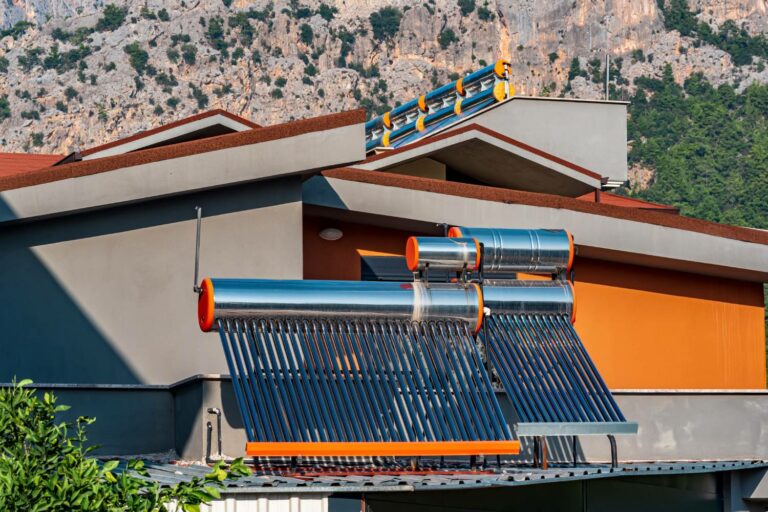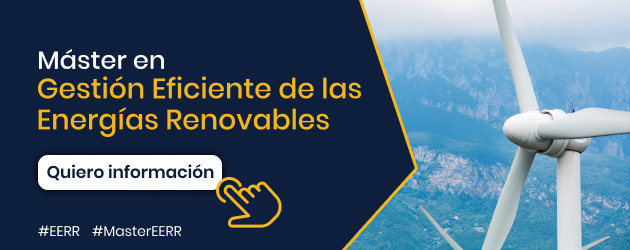Sustainable heat
In the context of environmental awareness and the energy sector's transition to renewable energy sources, Spain is in a privileged position.
With more than 2,500 hours of sunshine per year, the country has significant solar potential that can be harnessed through solar thermal energy. The southern regions, in particular, such as Andalusia, Murcia and Extremadura, have exceptional conditions with solar radiation levels that exceed the 1,800 kWh/m² per year.
This solar potential translates into a significant theoretical capacity for power generation. For exampleFor example, if only 1% of the territory of Andalusia were used with solar thermal energy technologies, more than 50% of Spain's energy needs could be covered.This highlights the strategic importance of harnessing available solar resources and establishing efficient infrastructure for their exploitation.
Furthermore, Spain's geography offers diverse topographical options for implementing concentrated solar technologies, such as solar tower plants, which can be effective on terrain with varying elevations. This approach takes advantage of the country's specific geographic characteristics to maximize solar collection efficiency.
In this context, the relevance of investing in solar energy projects thermal power, not only to reduce greenhouse gas emissions, but also to strengthen the country's energy independence and foster the development of a long-term sustainable industry.
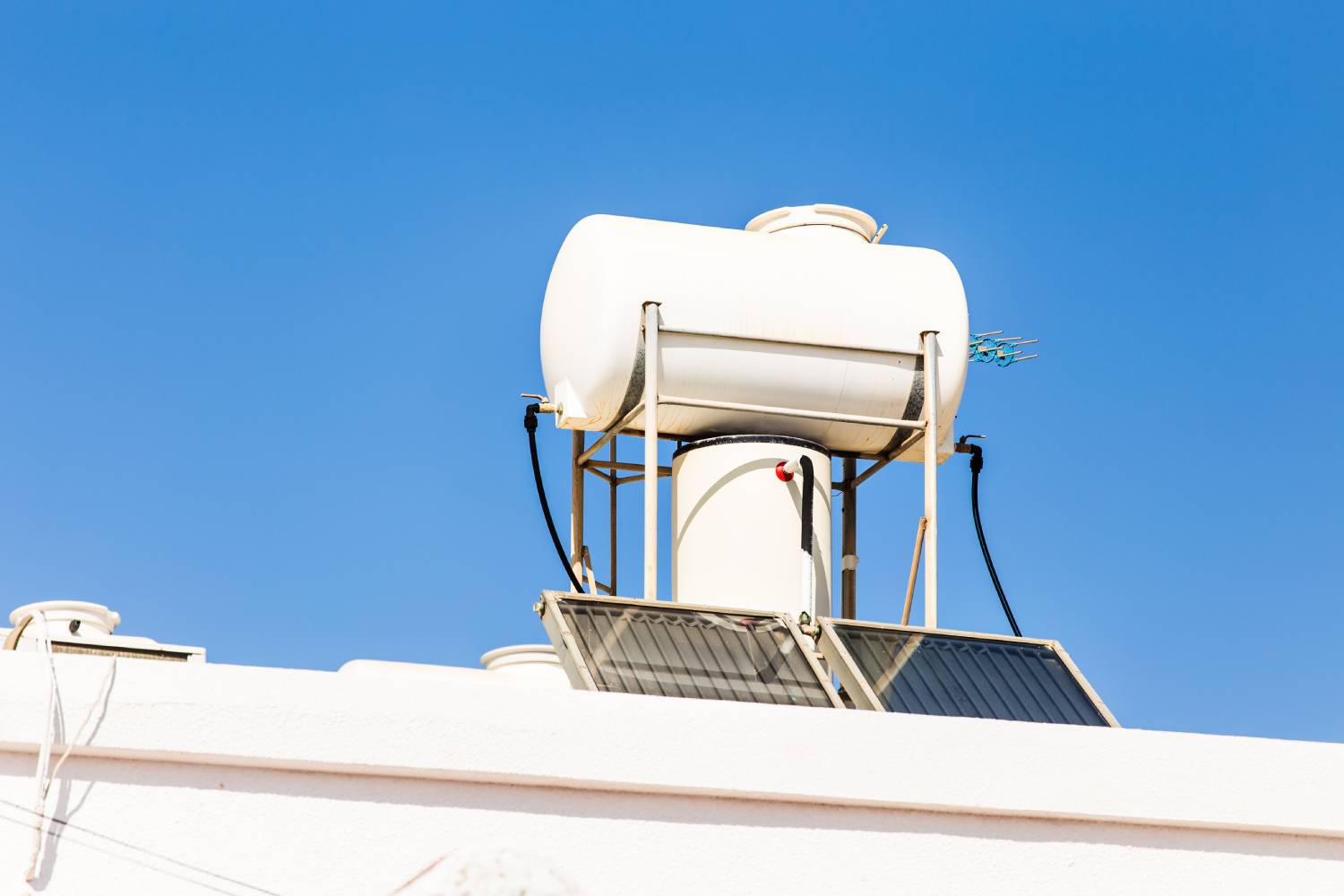
Principles of Solar Thermal Energy:
Solar thermal energy harnesses solar radiation to generate heat, which can then be used for a variety of applications, from electricity production to hot water and space heating.
Solar thermal energy systems use solar collectors to capture solar radiation. These collectors can be of various types, such as flat-plate collectors or concentrators, depending on the specific application.
The solar radiation captured by the collectors is converted into heat. This can be achieved through various mechanisms, such as the absorption of radiation by a thermal fluid or the use of materials that generate heat when exposed to sunlight.
To overcome the intermittency of solar radiation, many solar thermal energy systems incorporate thermal storage systemsThese store the heat generated during periods of high radiation for later use when radiation is low or non-existent.
The heat generated can be used for a variety of applications, including generating electricity through thermodynamic cycles, producing steam in industrial processes, heating water for domestic use, and air conditioning buildings.
Current Utilization Systems:
Flat Solar Collectors: These are the most common and are used for low- and medium-temperature applications, such as water heating. They consist of an absorbent surface (usually black) that collects solar radiation and converts it into heat.
Vacuum Tube Collectors: This type of collector is more efficient than flat collectors under low-temperature conditions and is commonly used in solar hot water systems for residential and commercial applications.
Solar Concentrators: These systems use mirrors or lenses to concentrate solar radiation onto a focal point. Concentrators are ideal for high-temperature applications, such as electricity generation in solar thermal power plants.
Advanced Thermal Storage Systems: They include the use of molten salts, advanced thermal oils, or phase-change materials to store heat efficiently and for long periods. This allows for energy generation even during periods of low solar radiation.
Hybrid Systems: Combining technologies such as solar thermal and photovoltaic energy in hybrid systems allows for more effective use of available solar resources and ensures continuous energy generation.
In short, solar thermal energy and its current utilization systems are presented as a versatile and effective solution for addressing energy needs in the Spanish context, offering diverse and sustainable applications in different sectors of society.
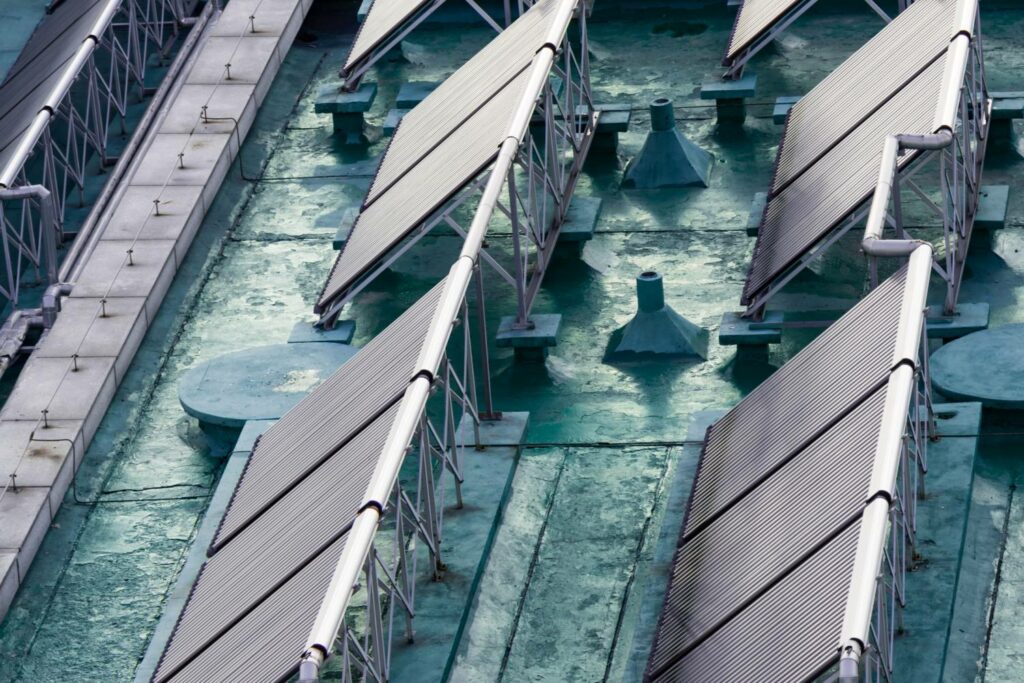
Latest Technologies and Innovations in Solar Thermal Energy Systems
Solar thermal energy has undergone significant technological advances in recent years, establishing itself as an increasingly competitive and efficient option in the energy landscape. Innovations focus on improving the capture and storage of solar energy, as well as optimizing processes to increase project profitability.
Concentrated Solar Systems
Concentrating solar technologies, such as parabolic troughs and solar towers, have evolved to maximize the capture of solar radiation. Parabolic troughs, for example, now incorporate highly precise solar tracking systems that improve efficiency by constantly orienting themselves toward the sun. solar towers, on the other hand, have experienced improvements in thermal storage capacity and in the efficiency of converting solar energy into electricity.
Advanced Thermal Storage
One of the historical challenges of solar thermal energy has been the intermittency of solar radiation. Innovations in thermal storage systems have addressed this problem, allowing heat to be stored during periods of high radiation for later use, even in the absence of sunlight. Materials such as molten salts, advanced thermal oils, and phase-change materials are being used to improve thermal storage capacity and efficiency.
Integration of Digital Technologies
Digitalization is playing a crucial role in the optimization and control of solar thermal energy installations. Advanced monitoring systems, artificial intelligence and weather prediction algorithms They allow for more efficient management of generated energy. The ability to predict solar availability and dynamically adjust system operation contributes significantly to project stability and profitability.
These technological innovations are transforming the solar thermal energy landscape, making it more competitive compared to conventional energy sources. Continued investment in research and development in this field promises to further improve efficiency and reduce costs, paving the way for a faster transition to a sustainable energy system in Spain.
Spanish Regulations and Regulatory Framework
The drive toward a sustainable energy future in Spain is supported by robust regulations and a regulatory framework designed to encourage the adoption of renewable energy, including solar thermal energy. These regulations seek to establish an enabling environment for investment and project development, while strengthening the country's commitments to combating climate change.
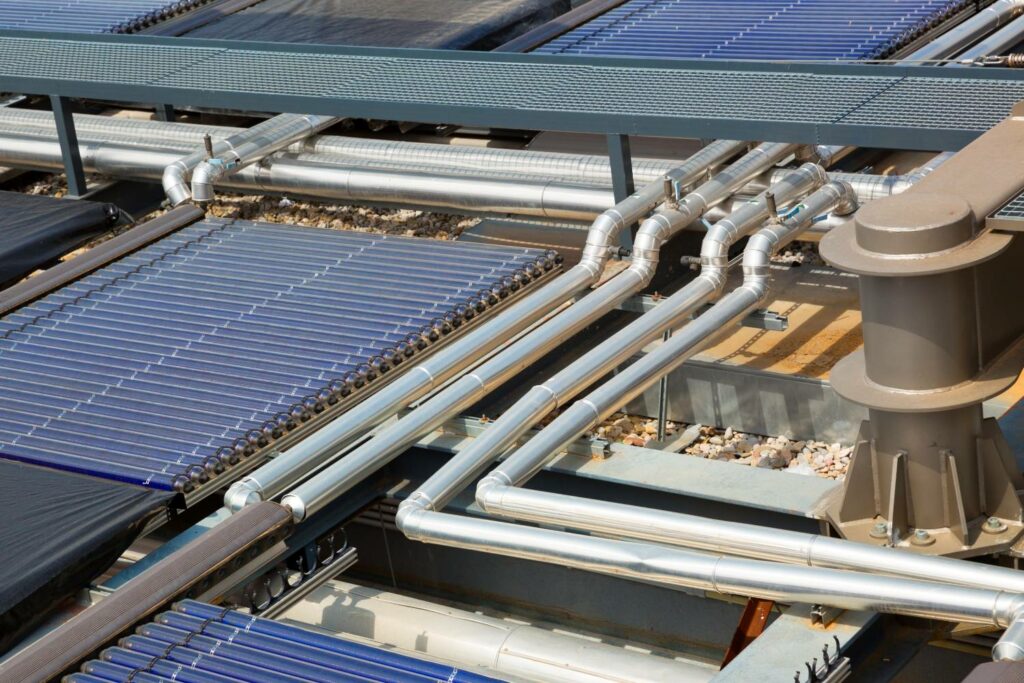
National Integrated Energy and Climate Plan (PNIEC)
The National Integrated Energy and Climate Plan (PNIEC) is the central pillar of Spanish regulations in the field of renewable energy. This plan sets ambitious goals to increase the penetration of clean energy sources into the national energy mix. In the case of solar thermal energy, specific targets are projected to enhance its contribution to the total thermal and electrical energy generation in the country.
Tax and Financial Incentives
The Spanish government has implemented a series of fiscal and financial incentives aimed at stimulating investment in solar thermal energy projects. These include tax breaks, direct subsidies, and preferential credit lines. These incentives not only reduce initial investment costs but also improve the long-term economic viability of projects.
Legal Framework for Self-Consumption
Spanish regulations have also made progress in the area of self-consumption, allowing users to generate and consume their own energy, including solar thermal energy, in a more flexible and efficient manner. The possibility of injecting surplus energy into the grid and receiving compensation contributes to the profitability of solar thermal energy systems installed in homes, industries and businesses.
Energy Certification and Labeling
Energy certification and efficiency labeling are key components of Spanish regulations that directly affect solar thermal energy systems. These instruments seek to Inform consumers about the efficiency of equipment and encourage the choice of more sustainable technologiesThe energy label on solar thermal equipment provides clear guidance on its performance and contributes to raising awareness about the importance of energy efficiency.
The combination of these elements in Spanish regulations creates a solid and favorable framework for the development of solar thermal energy, facilitating the implementation of large- and small-scale projects throughout the country. Regulatory clarity and institutional support are key factors that boost investor confidence and accelerate the adoption of this innovative and sustainable technology.
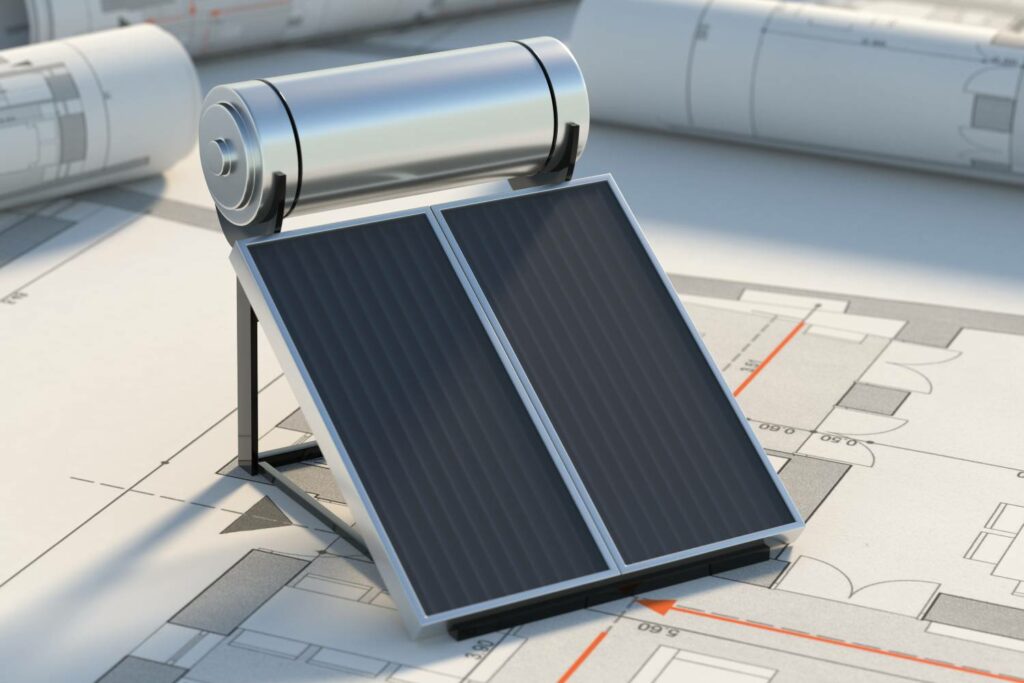
Energy efficiency and types of use of solar thermal energy
Efficiency in the generation and application of solar thermal energy is an essential component for its success and widespread acceptance. In the Spanish context, optimizing efficiency not only translates into economic benefits but also contributes to reducing emissions and meeting established environmental objectives.
Efficiency in Electricity Generation
In the field of solar thermal electricity generation, efficiency has become an area of constant improvement. The implementation of high-precision solar tracking systems and advanced concentrating technologies has significantly increased the efficiency of converting solar radiation into electricity. The incorporation of thermal storage systems helps maintain constant production even during periods of low radiation, improving the overall efficiency of the system.
Applications in Industry and Air Conditioning
Solar thermal energy is used efficiently in industrial applications, such as steam production for industrial processes and air conditioning of buildings. In industry, the replacement of fossil fuels with solar thermal energy systems Not only does it reduce emissions, but it also lowers long-term operating costs. In the HVAC sector, solar thermal heating and cooling has become a sustainable and economically viable option, especially in sunny climates like Spain.
Efficiency in Residential and Commercial Heating
In residential and commercial settings, solar thermal energy is efficiently applied in water heating systems. Solar collection systems for water heating are widely used, reducing dependence on conventional energy sources and lowering the associated carbon footprint. Furthermore, The combination of solar heating systems with energy-efficient technologies in buildings contributes to a more sustainable and efficient use of thermal energy.
Innovations in Residential Efficiency
In the residential sector, the latest innovations focus on hybrid systems that combine solar thermal energy with other renewable energy sources, such as solar photovoltaics. These systems offer greater flexibility and efficiency, allowing users to adapt to variations in solar radiation availability and optimize energy generation according to their specific needs.
Continuous optimization of efficiency in these different types of applications demonstrates the Versatility and adaptability of solar thermal energy in the Spanish contextImproved efficiency not only benefits end-users but also strengthens solar thermal energy's position as a comprehensive and effective solution in the transition to a more sustainable energy system in Spain.
Real cases of solar thermal use
The analysis of success stories and specific examples highlights the effective implementation of solar thermal energy in Spain, demonstrating its technical, economic, and environmental viability.
Gemasolar Solar Plant in Seville
The Gemasolar Solar Plant, located in Fuentes de Andalucía, Seville, represents a milestone in solar thermal energy generation in Spain. Operating since 2011, this plant uses central tower technology with molten salt as a thermal storage medium. Gemasolar has not only demonstrated the ability to generate electricity during low-solar periods thanks to its storage system, but has also set efficiency and reliability standards for similar projects.
Self-consumption projects in industry
Numerous self-consumption projects in Spanish industry have successfully adopted solar thermal energy systems to reduce costs and emissions. Companies in sectors such as food, textiles, and chemicals have integrated solar collectors for steam generation and process heating, achieving not only long-term economic benefits but also a significant reduction in their carbon footprint.
Sustainable Residences and Buildings
In the residential and commercial sectors, sustainable building projects have incorporated solar thermal energy systems to meet heating and hot water needs. Examples such as the Las Boas residential complex in Ibiza have efficiently integrated solar thermal systems, offering residents a constant supply of hot water using state-of-the-art solar collection technologies.
Solar Air Conditioning Programs in Autonomous Communities
Several Spanish autonomous communities have implemented programs to promote solar air conditioning in public and private buildings. Projects such as the Community of Madrid's program for the installation of solar thermal systems in sports and educational centers demonstrate the regional commitment to harnessing solar thermal energy in practical applications, benefiting both public institutions and society at large.
The examples given illustrate the Diversity of applications and the effectiveness of solar thermal energy in different sectors in SpainThe experience gained from these projects has provided valuable lessons and demonstrated that the adoption of this technology can be successful in different contexts, strengthening confidence in large-scale implementation in Spain's sustainable energy future.
In our new Master in Renewable Energies, Smart Grids and Electric Mobility you will be able to delve into everything you need to become a specialist in solar energy and in others renewable energy.

